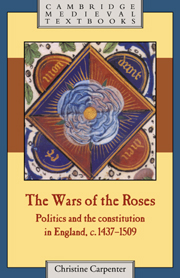Book contents
- Frontmatter
- Contents
- List of illustrations
- Preface
- Introduction
- 1 Sources and historiography
- 2 The governance of England in the fifteenth century I: kings, kingship and political society
- 3 The governance of England in the fifteenth century II: nobility, gentry and local governance
- 4 The Lancastrian kings to c. 1437
- 5 Henry VI's adult rule: the first phase c. 1437–1450
- 6 The road to war: 1450–145
- 7 The end of Lancastrian rule: 1455–1461
- 8 Edward IV's first reign: 1461–1471
- 9 The triumph of York: 1471–1483
- 10 Richard III and the end of Yorkist rule: 1483–1485
- 11 Henry VII and the end of the wars: 1485–1509
- 12 Conclusions
- Bibliographical notes
- Index
- Cambridge Medieval Textbooks
5 - Henry VI's adult rule: the first phase c. 1437–1450
Published online by Cambridge University Press: 05 June 2012
- Frontmatter
- Contents
- List of illustrations
- Preface
- Introduction
- 1 Sources and historiography
- 2 The governance of England in the fifteenth century I: kings, kingship and political society
- 3 The governance of England in the fifteenth century II: nobility, gentry and local governance
- 4 The Lancastrian kings to c. 1437
- 5 Henry VI's adult rule: the first phase c. 1437–1450
- 6 The road to war: 1450–145
- 7 The end of Lancastrian rule: 1455–1461
- 8 Edward IV's first reign: 1461–1471
- 9 The triumph of York: 1471–1483
- 10 Richard III and the end of Yorkist rule: 1483–1485
- 11 Henry VII and the end of the wars: 1485–1509
- 12 Conclusions
- Bibliographical notes
- Index
- Cambridge Medieval Textbooks
Summary
We are far from certain of when Henry VI really began to rule without any formalised guidance. That is a highly significant fact, for a major debate about the reign in recent years has been the extent to which Henry himself ruled at any time. It used to be thought that the answer was not at all. As K. B. McFarlane put it succinctly, ‘In Henry VI second childhood succeeded first without the usual interval.’ The standard interpretation followed contemporary descriptions of the king, notably that of his confessor, John Blacman. Much was made of his lack of interest in worldly affairs, his consequent neglect of the business of rule and his wholesale commitment to spiritual matters, which was seen most spectacularly in the great foundations of Eton and King's College, Cambridge, Henry's only worthwhile legacy. Then B. P. Wolffe wrote an almost deliberately provocative piece, followed by lengthier treatment of the same hypothesis in his book, proposing that Henry was less inert than has been supposed and that, like Edward II, he himself made his own positive contribution to the disasters of his reign. He suggested that all the evidence that had been used to support the traditional view was tainted, in that it post-dated the reign, and that Blacman was especially suspect because he was writing under Henry VII when moves were afoot to canonise Henry VI.
- Type
- Chapter
- Information
- The Wars of the RosesPolitics and the Constitution in England, c.1437–1509, pp. 87 - 115Publisher: Cambridge University PressPrint publication year: 1997



